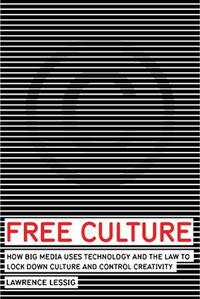Free Culture (book)

Original cover
|
|
| Author | Lawrence Lessig |
|---|---|
| Country | United States |
| Language | English |
| Genre | Non-fiction |
|
Publication date
|
2004 |
| Media type | Print (Hardcover and Paperback) |
| ISBN | |
| Preceded by | The Future of Ideas |
| Followed by | Code: Version 2.0 |
Free Culture: How Big Media Uses Technology and the Law to Lock Down Culture and Control Creativity (published in paperback as Free Culture: The Nature and Future of Creativity) is a 2004 book by law professor Lawrence Lessig that was released on the Internet under the Creative Commons Attribution/Non-commercial license (by-nc 1.0) on March 25, 2004.
This book documents how copyright power has expanded substantially since 1974 in five critical dimensions:
It also documents how this industry has successfully used the legal system to limit competition to the major media corporations through legal action against:
The result is a legal and economic environment that stifles "the Progress of Science and useful Arts", exactly the opposite of the purpose cited in the US Constitution. It may not be possible today to produce another Mickey Mouse, because many of its early cartoon themes might be considered "derivative works" of some existing copyrighted material (as indicated in the subtitle to the hardback edition and in numerous examples in this book).
This book is an outgrowth of the U.S. Supreme Court decision in Eldred v. Ashcroft, which Lessig lost. Article I, Section 8, Clause 8 of the U.S. Constitution says, "The Congress shall have Power... to promote the Progress of Science and useful Arts, by securing for limited Times to Authors and Inventors the exclusive Right to their respective Writings and Discoveries." Several times in the past century, congress has extended the copyright law in several ways. One way was to extend the term "on the installment plan". Another was to broaden the scope to include not only copying but creating "derivative works". This latter broadening is so ambiguous that it provides a foundation for massive abuse of power by companies holding large copyright portfolios. For example, the Recording Industry Association of America sued a freshman at Rensselaer Polytechnic Institute (RPI) for $10,000,000 for improving a search engine used only inside RPI. Lessig cites another example where Fox demanded $10,000 for the rights to use a 4.5 second video clip with The Simpsons playing on a television in a corner of a scene in a documentary. Anyone producing a collage of video clips can potentially be similarly sued on the grounds the collage is a "derivative work" of something copyrighted or that the collage contains a shot that is copyrighted. Lessig argues that this substantially limits the growth of creative arts and culture, in violation of the US Constitution; the Supreme Court ruled that Congress has the constitutional authority to properly balance competing interests on cases like this.
...
Wikipedia
